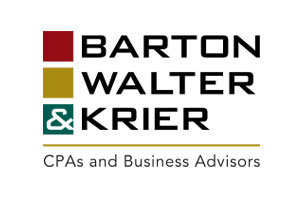Category: Tax Services
Guide to Small Business Tax Accounting | 6 Strategies
February 7, 2024 | Barton Walter and Krier
Tax season is officially underway, and let’s be honest, it’s not most people’s favorite time of year. You might love owning a business but get nervous every time you think of that April 15 deadline. Don’t worry! At Barton, Walter & Krier, we have all the tips and strategies you’ll need to minimize your business’s tax burden and maximize profitability. Without further ado, here is our 2024 guide to small business tax accounting. 1. Prepare Financial Records The first step to a successful tax season is preparing your financial records. It helps to maintain these records throughout the year so that you don’t have to scramble to find them at the last minute. Track all business income and expenses in one place for easy access. […]
Read MorePlan Ahead for Tax Season
September 26, 2023 | Barton Walter and Krier
Every year it seems as though the scramble around tax time is inevitable. But the tax experts at Barton, Walter & Krier are here to help. We’ve got the inside scoop on things you can do throughout the year to ensure you’re prepared, saving you time, money, and potential headaches. Keep reading to learn a few year-round tax tips to help you plan ahead for tax season. Tax Time Timeline Because of additional tax obligations, tax season looks a bit different for businesses than for individuals. Unless filing for an extension, individual tax returns are due on April 15. Depending on your business type and the tax year, the due date for business taxes can vary. Additionally and for businesses required to pay them, quarterly […]
Read MoreBe Prepared for Tax Season
February 28, 2023 | Barton Walter and Krier
With the new year officially here, it’s only a matter of time before we’re all in the midst of the tax time rush. Last-minute number crunching can be stressful, both for business owners and their tax professionals. We have some basic and simple ideas to help ensure you’ll be prepared for tax season so that your filing process goes smoothly. Organize Financial Records and Receipts Hopefully you’ve been keeping tabs on your business’s performance over the last year. Documenting and analyzing financials each month gives you an idea of the health and profitability of your company. Bring those records as well as any receipts for business expenses when meeting with your tax professional. Keeping your documents together will help ensure you have the information your […]
Read More

